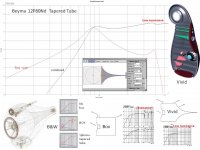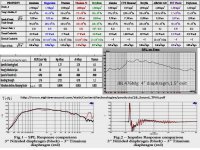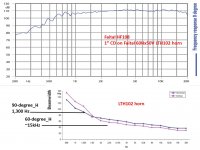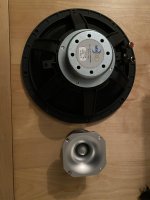It's about frequencies that need to be produced, not speaker size. A good 12" will easily cover the range you need.
The Faital 12PR320 uses a triple roll cone surround which usually produces greater low level details than the double M-Roll used on the 12PR330. The 12PR320 has a slightly lower Le, Mms, and Fs which should make it a slightly better sealed volume midrange.... -F3 ~90Hz in a sealed 1.1cuft volume. A midrange box built with a large open volume behind the driver to allow explosive air movement, with a stuffed tapered rear volume behind to reduce resonances is used in high-end speakers.
https://www.diyaudio.com/forums/mul...s-faital-pro-12pr3x0-drivers.html#post6415343
You want to select a tweeter horn/waveguide which has the same polar directivity as the 12" midbass at the crossover frequency. Good summary in Earl Geddes "Directivity in Loudspeaker Systems" paper
http://www.gedlee.com/Papers/directivity.pdf
Drawing the floorplan of your room including furniture and desired critical listening location will help you select the best high frequency horn directivity.... to avoid early side wall reflections but still cover the listening location. 90degrees_H like SEOS15 waveguide ..... 60degrees-H like Faital LTH102 horn
https://www.diyaudio.com/forums/mul...s-faital-pro-12pr3x0-drivers.html#post6415343
You want to select a tweeter horn/waveguide which has the same polar directivity as the 12" midbass at the crossover frequency. Good summary in Earl Geddes "Directivity in Loudspeaker Systems" paper
http://www.gedlee.com/Papers/directivity.pdf
Drawing the floorplan of your room including furniture and desired critical listening location will help you select the best high frequency horn directivity.... to avoid early side wall reflections but still cover the listening location. 90degrees_H like SEOS15 waveguide ..... 60degrees-H like Faital LTH102 horn
Attachments
change the horn? what for a 2 "1000-10000hz?
My previous suggestion should offer a better result.. but:
For that do a search with:
2 inch 90 x 40 constant directivity horn
ex.
https://www.bcspeakers.com/media/W1siZiIsIjIwMTMvMDMvMTEvMTUvNTMvNTkvNjk4L2ZpbGUiXV0
Fairly uniform (Horizontally) up to 16 kHz with just a bit of "sag" or "waist-banding" around 1 kHz and some marginal "bloom"/expansion above 3 kHz (which subjectively is preferable).
Last edited:
I keep reading that the best mids are reproduced by a 10"
You can build an exceptional 3-way using either a 10" or 12" midbass. Most designers start with the room size, shape, and seating and select the best horn directivity pattern. In the USA it is easy to get 90H x 40V SEOS 12" & 15" waveguides, plus the B52/QTC horn. Fatial offers 60H x 50V LTH102 for greater pattern control.
For "The Loudspeaker 1 and 2" Troels Gravensen selected the 18Sound NSD1095N HF Neodymium 1" Compression Driver because he favored the tone of the Titanium dome with a TiN coating. The NSD1095N specifies a crossover frequency >1,600Hz, which is best matched with a 10" midbass. Most 12" midbass favor a crossover ~1,100 - 1,300Hz and will beam and breakup at 1,600Hz.
Attached spec Faital HF108 compression driver on 60Hx50V Faital LTH102 horn crossed at 1,300Hz, showing starting ~90-degree room directivty and reaching 60-degreesH above 15kHz.
Attachments
Thanks!! Then I'll use the pr320The 12PR320 has a slightly lower Le, Mms, and Fs which should make it a slightly better sealed volume midrange....
great! but i don't know how to calculate the box e and the vent, do you have a suggestion?A midrange box built with a large open volume behind the driver ...
the room is 4.2m x 4.8m, soundproofed, without furniture, just some gymnastic equipment
I found the datasheet of my horn to see if it is to be thrown away
Attachments
so are you telling me that a 3 way system with faital hf108 1300-20000hz is better?Attached spec Faital HF108 compression driver on 60Hx50V Faital LTH102 horn crossed at 1,300Hz ....
options on the 12 inch mid
Hi Jenoux,
This https://www.beyma.com/speakers/Fich...rs-data-sheet-low-mid-frequency-12P80FeV2.pdf
12 inch Beyma is very highly regarded and perfectly suited to small sealed enclosures, I have attached a sim.
All the best
A.
Hi Jenoux,
This https://www.beyma.com/speakers/Fich...rs-data-sheet-low-mid-frequency-12P80FeV2.pdf
12 inch Beyma is very highly regarded and perfectly suited to small sealed enclosures, I have attached a sim.
All the best
A.
Attachments
PS, The Beyma is a far more in absolute efficiency ie 3% Vs 2% = a 50% increase in efficiency for the Beyma.
Also the higher power handling / max SPL means even if you dont need the higher SPL the benefits are that the driver is always operating well within its power/thermal/distortion limits.
Note the power to weight Mms/Bl ratio of 3.8 for the Faital Pro Vs 3.3 for the Beyma... Smaller number = higher power to weight ratio.
Also look at the AES power handling - 700 watts Beyma (4 inch voice coil) Vs the 300 watts Faital Pro (65mm voice coil) so the ration of cone mass to VC mass is important as its the coil (and magnetic energy in the gap) that "powers" the cone.
As you can tell I love the sound of this driver!
Also the higher power handling / max SPL means even if you dont need the higher SPL the benefits are that the driver is always operating well within its power/thermal/distortion limits.
Note the power to weight Mms/Bl ratio of 3.8 for the Faital Pro Vs 3.3 for the Beyma... Smaller number = higher power to weight ratio.
Also look at the AES power handling - 700 watts Beyma (4 inch voice coil) Vs the 300 watts Faital Pro (65mm voice coil) so the ration of cone mass to VC mass is important as its the coil (and magnetic energy in the gap) that "powers" the cone.
As you can tell I love the sound of this driver!
... 2 inch 90 x 40 constant directivity horn ...
I like this:
P-Audio PH-2380 2" Throat High Frequency Horn
fron humble: The P-Audio PH-2380 is based on the legendary JBL 2380A flat
front bi-radial horn
do I proceed with the purchase?
40 - 80 Hz
80 - 800Hz
800 - 8K
>8k
The reason is that the demands on a speaker below and above 80 Hz are considerably different. If you want a killer 40 Hz, 200 Hz from the same driver will be comprimised. 800-8K keeps the important harmonics together.
I don't think this is true, at all, but perhaps with a bit more explanation........
..........JBL might decide to change its entire professional line, beginning with the M2.
Last edited:
sorry i don't speak english well, i didn't understand your suggestion.My previous suggestion should offer a better result.. but:
I did not understand how I should integrate the components you recommended
should the dfm-2535r00-08 replace the n980?
should the Beyma TPL-150H replace combo + supertweeter or just supertweeter?
the Radian LT 2 has little sensitivity and little power handling, how could I use it? should I strongly attenuate the combo?
sorry i don't speak english well, i didn't understand your suggestion.
I did not understand how I should integrate the components you recommended
should the dfm-2535r00-08 replace the n980?
should the Beyma TPL-150H replace combo + supertweeter or just supertweeter?
the Radian LT 2 has little sensitivity and little power handling, how could I use it? should I strongly attenuate the combo?
Cone driver (between 8-12"s) in an appropriate waveguide. about 250 to 900 Hz. The one shown has a directivity pattern that should match well with your rcf n980+h6040.
rcf n980+h6040 between 900 and *3.5 kHz.
LT2 Planar with waveguide for *3.5 kHz up.
*though you could go as low as 2.5 kHz depending on the crossover.
Horizontal polar coverage result:
<400 Hz: Omni
>400 Hz to 3 kHz: more "narrow"/limited dispersion
>300 Hz up: becoming wider in dispersion with a top-octave (10-20 kHz) that's quite wide horizontally for added "air".
Notably however, with the right filter (and overall design) the result should have a very stable smooth transition for those driver/waveguide combo's on virtually all horizontal axis's.
Last edited:
the toys arrived, the birch plywood arrives in a few days, construction begins
An externally hosted image should be here but it was not working when we last tested it.
[Moderators Note: Image attached, rather than linked to]
Attachments
Last edited by a moderator:
- Home
- Loudspeakers
- Multi-Way
- BIG 4 way using what I have (like "the loudspeaker"



